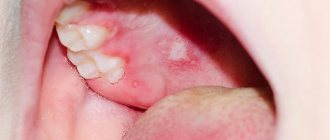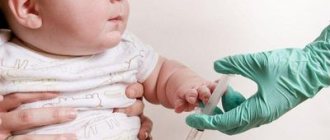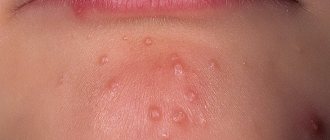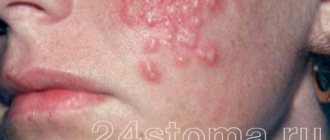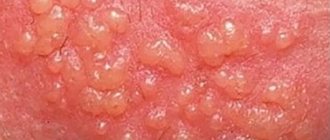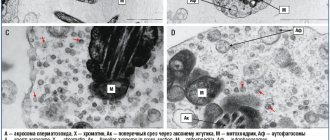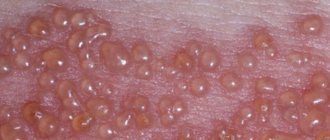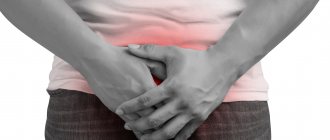Almost everyone is familiar with a “cold” on the lips. As soon as you catch a runny nose or get nervous, an unpleasant harbinger immediately appears - a tingling sensation somewhere around the mouth.
The herpes simplex virus is present in the body of 95% of people. And only a few have immunity, the reasons for which are still unclear.
The virus enters the body in early childhood: at 3–4 years, when the antibodies against the herpes virus transmitted to the baby by the mother are depleted. Most often, infection occurs if a child is kissed by carriers of the infection. In addition to a kiss, the virus can enter the body, for example, with saliva. It penetrates the mucous membranes, reaches the nerve endings, rises into the cranial cavity, where it “hides” in a nerve plexus called the trigeminal ganglion and “sleeps” there until it is reactivated.
Symptoms of herpes
The clinical picture of the disease depends on the type of pathogen and the location of the affected area. Infection with all strains of herpesvirus is characterized by redness of the skin or mucous membranes and the appearance of blisters. Pain and burning may be felt in the inflamed area. But you can’t puncture the blisters, as this will worsen the course of the disease.
After two or three days, the bubbles begin to burst. In their place, ulcers form. The affected area on the lips is covered with a crust, and on the mucous membranes it is filled with fibrinous tissue. If antiviral treatment is not carried out, the disease will reappear when immunity decreases.
Often, when the disease occurs, the body temperature rises to 37–38 degrees. Therefore, in everyday life it is often called a cold. But herpesvirus is not the cause of acute respiratory diseases. Treatment of labial herpes with cold remedies is ineffective. It is necessary to determine the type of herpes virus and undergo a treatment regimen prescribed by a doctor.
Herpes lips
Infection with herpesvirus type 1 often results in blisters on one or both lips. A day before their formation, the patient may feel general weakness. The bubbles burst on their own on the second or third day. Instead, a crust appears that cannot be peeled off. It disappears on its own after seven or ten days.
In the eye area
The herpes virus can cause inflammation of one or both eyes, as well as the eyelids. Touching this area with unwashed hands often causes damage to this area. Symptoms of the disease are:
- pain or stinging in the eyes;
- increased photosensitivity;
- redness of the mucous membranes;
- formation of blisters on the eyelids.
Advanced herpes in this case is dangerous. Complications of the disease can cause complete loss of vision and the formation of scars on the eyelids. When the first symptoms of eye damage appear, you should immediately consult a doctor.
Herpes face
Lesions may occur on the forehead, chin, both cheeks, the back and tip of the nose, and on the ears. Often the affected area appears where there have already been microtraumas on the skin.
In the oral cavity
Inflammation of the mucous membranes of the oral cavity is called “herpetic stomatitis”. This disease in children is accompanied by gingivitis (inflammation of the gums). When the bubbles with liquid burst, erosions are formed, covered with a whitish coating. Redness is observed around the erosion zone. A person experiences pain while eating and brushing his teeth.
Genital herpes
The disease affects the pubis, buttocks, genitals and anus. Clusters of bubbles with liquid inside appear on the skin. The area around them turns red, pain, itching, and irritation appear. Genital herpes is transmitted through barrier-free sexual intercourse. The cause of infection can be touching the groin area with unwashed hands.
Prevention and treatment of the disease
A herpetic infection can resolve on its own without treatment, but in this case the recovery period will be longer and range from 1 to 3 weeks. If you start taking medications on time, the disease will go away faster and easier. Treatment should begin when the first symptoms appear - burning and tingling, in places typical for the virus.
Also, do not forget about preventive measures. Try to plan your day correctly, get enough sleep, and avoid stressful situations. On sunny days, use protective creams, and in the cold season, moisturizing hygienic lipsticks.
The following groups of drugs are used to treat herpes:
- Antiviral agents in the form of ointments and tablets. The most commonly used are Acyclovir, Penciclovir, and Valaciclovir. When using them, the duration of the disease can be reduced to three days.
- Painkillers and antipyretics. They are used to relieve unpleasant symptoms: high fever, itching and burning. If such manifestations occur, you can take paracetamol or any NSAID (Nise, Nimesil, Ibuprofen).
- Folk remedies also help combat discomfort during illness. Gel with aloe vera extract, witch hazel and lemon balm have proven themselves to be effective in treating infections.
Classification of herpes viruses
Researchers have identified 8 strains of herpesvirus that can infect humans:
- First. Causes inflammation of the lips and mouth (labial herpes). In rare cases, it can cause genital rashes.
- Second. Affects the genitals and groin area. Causes genital or vaginal herpes. Less commonly, it is the causative agent of oral herpes.
- Third. Causes chickenpox and shingles.
- Fourth. Known as Epstein-Barr virus. Causes mononucleosis, lymphomas and carcinomas.
- Fifth. Cytomegalovirus. Causes mononucleosis, hepatitis, herpetic retinitis.
- Sixth and seventh. Roseoloviruses. They cause roseola, exanthema. May be one of the causes of chronic fatigue.
- Eighth. Causes lymphoma, Kaposi's sarcoma, Castleman's disease.
The causative agent of herpes simplex is herpesvirus type I or II. There is a misconception that the disease cannot be cured. In fact, herpes is curable. Although modern medicine cannot completely remove the virus from the body, it is possible to suppress its vital activity so much that it stops causing inconvenience.
Types of herpes simplex virus and their features
If we talk about such a manifestation of herpes as a “cold” on the lips, then it is caused by the first two types of virus: HSV-1 and HSV-2. They are very contagious and contribute to the appearance of small bubbles - vesicles - on the mucous membranes. The favorite site of manifestation of HSV-1 is the oral cavity, and HSV-2 usually affects areas in the genital area.
Herpes disease does not always appear only on the lips or genitals. Other areas of the body may also be affected: fingertips, cornea, skin, internal organs and systems, even the spinal cord and brain.
Causes of exacerbation of herpes
When self-treating herpes, there is a chance of relapse. Incorrect selection of a course of therapy suppresses the virus temporarily. The occurrence of relapses is provoked by the following factors:
- Re-infection after interaction with a sick person.
- Reduced immunity.
- Prolonged hypothermia of the body.
- Exposure to direct sunlight.
- Microtraumas of the skin and mucous membranes.
- Physical fatigue, lack of sleep.
- Nervous overstrain.
- Women have menstruation.
Most people infected experience relapses once or twice a year. With weak immunity, relapses are possible 5–20 times a year. This is how recurrent herpes type 1 manifests itself, treatment of which is possible only under the supervision of a doctor.
Factors that provoke recurrence of herpetic infection
- Colds viral and bacterial infections
- Hypothermia of the body
- Stress and overwork
- Immunodeficiency conditions
- Nonspecific endocrine disorders
- Fasting, hypovitaminosis, general exhaustion
- Excessive tan
If the herpes virus gets on the skin or mucous membranes from the outside, then a herpes infection develops regardless of the virus carrier. The main route of transmission of the virus from a sick person to a healthy person in this case is through household contact, through kissing, a shared towel, dishes, household items or sexual contact.
Diagnosis of the disease
The presence of herpesvirus in the body can be detected using various methods. We list the effective methods that are used in our modern laboratory:
- Polymerase chain reaction. Allows you to determine the DNA of the virus in the taken material.
- Linked immunosorbent assay. Detects the presence of antibodies that are formed in the body when infected with a virus. The stage of the disease can be determined by the concentration of antibodies.
- Immunofluorescence reaction. The biomaterial is treated with an active substance that makes the antigens glow.
- Cultural technique. Sowing biomaterial on a nutrient medium. Studying the development of the virus under a microscope.
- Serological analysis. Detects class G and M antibodies and their avidity. Often used to diagnose genital herpes. The biomaterial is blood taken from a vein.
With any diagnosis there is a chance of getting a false positive result. An accurate diagnosis is made after several studies.
Treatment methods
There is no single way to quickly cure the virus: herpes occurs differently in different people. The treatment method depends on the strain, location of the affected area and other factors. At Polyclinic +1, doctors select a suitable herpes treatment regimen for each patient. Comprehensive treatment of infection with drugs prescribed by a doctor gives quick results.
Creams and ointments
The most popular drug is Acyclovir. It is available in the form of a cream or ointment with an active ingredient content of 5%: Acyclovir-Sandoz, Zovirax, Acyclovir-hexal. For treatment, it is better to use creams rather than ointments. Creams are better absorbed into the affected areas. The drugs must be applied to the affected area five times a day for seven days.
Despite its prevalence, acyclovir is considered an obsolete drug. It copes poorly with relapses of the disease, eliminates symptoms, but does not suppress the virus inside the body. In 30% of patients, treatment with acyclovir does not produce results.
A more modern drug is penciclovir. Fenistil Pentsivir is manufactured on its basis. This cream contains propylene glycol + cetomacrogol. They accelerate the penetration of the active substance into the skin. Only 0.2% of strains are resistant to Fenistil Penciclovir. The reproduction of the herpes virus stops on the second day after applying the cream, making the healing process faster. But the drug has a drawback: it is not suitable for children under twelve years of age.
Pills
When a treatment regimen for herpes in adults is drawn up, drugs can be prescribed in tablet form. The use of potent tablets is permitted for the treatment of adolescents over twelve years of age. When treating young children, parents should use the Viferon ointments and suppositories listed above.
The action of acyclovir in tablets is similar to the action of the ointment of the same name. The tableted drug is inexpensive and available in almost every pharmacy. It is approved for use in the treatment of children under twelve years of age.
Valaciclovir is used to synthesize acyclovir. It is contained in the drug Valtrex. When the tablet enters the body, valacyclovir is converted to acyclovir. This technique increases the concentration of the drug in the body. The effect of taking valacyclovir can be compared with intravenous administration of acyclovir. It is suitable for people with normal immunity.
Famciclovir is the most effective medicine for herpes. After administration, famciclovir is almost completely absorbed and quickly turns into active penciclovir, which allows you to get rid of symptoms and suppress the activity of the herpes virus. Famciclovir is contained in the drugs Famvir and Favirox. A single dose of three tablets is allowed to quickly stop inflammation. Famciclovir is suitable for adults with weak immune systems.
Folk recipes
Traditional recipes help eliminate the symptoms of the disease, but do not fight the herpes virus as the cause. Here are examples of common recipes:
- Apply lemon balm essential oil to the affected area every two hours.
- Lubricate the area of inflammation with Kalanchoe juice three times a day.
- The affected area can be lubricated with crushed garlic cloves three times a day. If garlic causes a burning sensation, you should choose a different recipe.
- A mixture of bee honey and apple cider vinegar, taken in a ratio of 1 to 1, can be applied to the inflamed area. Treat the skin three times a day.
We do not recommend treatment solely according to traditional recipes. To eliminate symptoms and suppress the activity of the herpes virus, use medications prescribed by an experienced doctor.
Treatment of herpes virus by a specialist
The symptoms of herpes can be similar to those of other diseases. For example, genital herpes can be confused with other sexually transmitted diseases. The cause of inflammation in the mouth is not only herpetic stomatitis, but also aphthous stomatitis. In this regard, when the first signs appear, you should consult a doctor for an accurate diagnosis and treatment.
Treatment of all forms of herpetic infection in our clinic “Polyclinic +1” is carried out by highly qualified dermatologists, venereologists, and gynecologists. They will conduct a thorough diagnosis and prescribe effective therapy with modern antiviral drugs. An integrated approach helps not only to suppress the activity of the herpes virus, but also to increase the body's defenses and achieve stable remission. When treating herpes during pregnancy, our doctors always take into account the possible risks to the fetus.
Attention! Self-administration of medications can be harmful if the diagnosis is made incorrectly. If you self-medicate incorrectly, you can harm your health by starting the course of the disease. To avoid relapses and complications, you should take medications under the supervision of a doctor.
Cost of treatment at Polyclinic +1
| Medical service | Cost, rub.) |
| Initial appointment with a dermatologist | 900 |
| Repeated appointment with a dermatologist | 600 |
| Initial appointment and examination with a venereologist | 900 |
| Repeated appointment with a venereologist | 600 |
| Drawing up an individual treatment plan | 1 200 |
| Drawing up a detailed treatment plan | 2 500 |
| Taking a smear for analysis | 500 |
| Blood collection for analysis | 500 |
| DNA diagnosis of latent herpes | 300 |
Where to go if your child has herpes
If signs of infection with a herpes infection appear, the child’s parents should contact their local pediatrician at the clinic at their place of residence so that the doctor can immediately prescribe treatment.
To prevent recurrence of infection caused by the herpes simplex virus, a specialist may suggest vaccination.
The doctor will also prescribe medications whose action is aimed at increasing immune defense - interferon and immunostimulants.
Prevention methods
What is herpes - it is a viral disease. It is transmitted by using other people's things, kissing, and unprotected contact. Preventive measures are aimed at preventing infection with the virus:
- Wash dishes thoroughly after other people.
- Do not take other people's towels, combs, toothbrushes and other personal hygiene items.
- Women should not use other people's lipsticks, glosses, or balms.
- Avoid touching your face and groin area with unwashed hands.
- Damage to the skin must be treated with disinfectants.
- Take vitamins regularly to strengthen your immune system.
- Avoid unprotected sexual contact with strangers.
When in contact with people who have visible symptoms of herpes, the risk of becoming infected is higher. But even if a person is a hidden carrier of the infection, he can become infected. Therefore, you need to follow the rules of personal hygiene.
Advantages of "Polyclinic +1"
- The consultation is conducted by experienced dermatologists and venereologists.
- Receive test results and make a diagnosis within 1 day.
- Official license to provide paid medical services.
- Possibility to take tests and undergo treatment anonymously.
- Convenient location in the center of Moscow, 5 minutes from Novokuznetskaya and Tretyakovskaya metro stations.
- Doctors are available daily from 9:00 to 21:00, including on weekends.
- Free parking is available for visitors (notify the administrator in advance).
conclusions
Only an experienced doctor can select an effective treatment regimen for herpesvirus. When deciding how to treat herpes on your own, you risk not getting the desired result, and sometimes even causing complications. Make an appointment with a doctor at the phone number indicated on the page to get rid of unpleasant symptoms and forget about relapses.
The article was checked for compliance with medical standards by a leading specialist at the Polyclinic+1 clinic, a dermatovenerologist, urologist, and mycologist.
Malashenko Vladimir Alexandrovich
Signs of the presence of herpes virus in the body
Anyone who has ever encountered such a problem knows how herpes manifests itself. Typically, herpes on the lips occurs in several stages and is accompanied by unpleasant symptoms.
- Itching and tingling . A few days before the herpetic rash appears, itching, burning or tingling in the lips may occur.
- Bubble formation . Small bubbles filled with clear liquid usually form at the border of the red border of the lips and the skin around the mouth. Herpes can also be located near the nose, ears or on the cheeks.
- Crusts and weeping . The vesicles burst, the liquid pours out, and shallow open wounds remain on the mucous membrane of the lips, which eventually become covered with a crust.
Most often, this is how the body reacts to the reappearance of symptoms, when the immune system has already developed an algorithm for how to get rid of herpes. The first manifestation of herpes on the lips can be more complicated and be accompanied by additional symptoms:
- fever;
- ulcers on the gums;
- sore throat;
- headache;
- muscle pain;
- enlarged lymph nodes.
